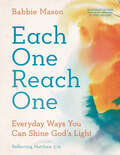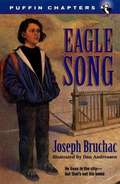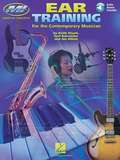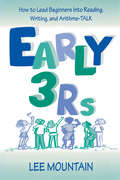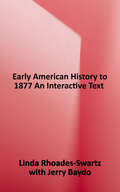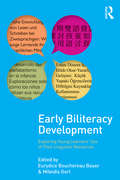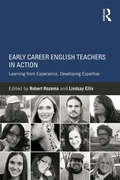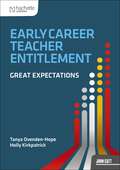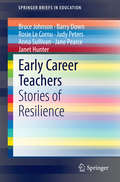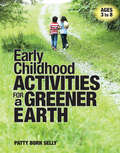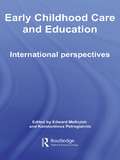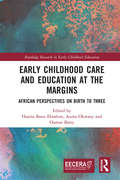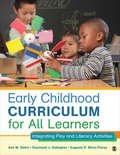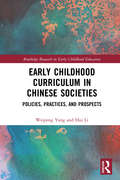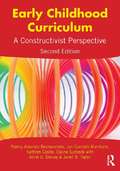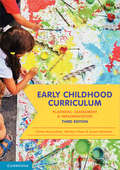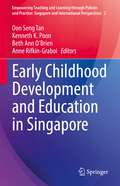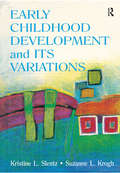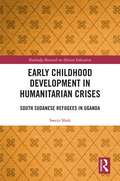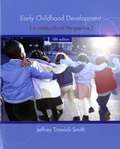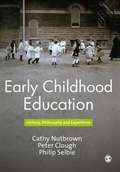- Table View
- List View
Each One Reach One: Everyday Ways You Can Shine God's Light (Reflecting Matthew 5:16)
by Babbie MasonThis energizing, highly interactive book from Grammy-nominated recording artist and two-time Dove Award–winner Babbie Mason inspires us to share our God story with confidence. Many of us want to talk about our faith with others, but we feel unprepared and uncomfortable. Written for Christians who long to live with more boldness and purpose, Each One Reach One equips us to: Find our own unique style of talking about Jesus. Approach evangelism with enthusiasm rather than a sense of obligation. Anticipate opportunities for telling others about Christianity. Use Scripture and reflection questions to draw closer to God&’s heart. Experience the joy of seeing others as Christ sees us. Sharing our story of Jesus doesn&’t have anything to do with rote lines, preachy words, or guilty feelings. As Babbie shows us, it has everything to do with listening well, practicing compassion, and demonstrating Christ&’s joy. Includes free streaming access to bonus videos.
Eagle Song
by Joseph BruchacAfter moving from a Mohawk reservation to Brooklyn, New York, fourth grader Danny Bigtree encounters stereotypes about his Native American heritage.
Ear Training: The Complete Guide For All Musicians
by Joe Elliott Wyatt Keith Carl J. Schroeder Keith WyattThis book takes you step by step through MI's well-known Ear Training course. Complete lessons and analysis include: basic pitch matching * singing major and minor scales * identifying intervals * transcribing melodies and rhythm * identifying chords and progressions * seventh chords and the blues * modal interchange, chromaticism, modulation * and more! Learn to hear and to visualize on your instrument. Take your playing from good to great! Over 2 hours of practice exercises with complete answers in the back.
Early 3 Rs: How To Lead Beginners Into Reading, Writing, and Arithme-talk
by Lee MountainThis practical, reader-friendly textbook for preservice and in-service early childhood education and early literacy courses provides "how-to-do-it" instructions for promoting emergent literacy in reading, writing, and arithmetic from preschool into the primary grades. Early 3 Rs answers the question: "What can I SAY and DO to give each child the best possible start on the 3 Rs?" With the strategies and materials in this book, a teacher can give personalized direct instruction in the 3 Rs to a beginner, in just a few minutes a day. The early chapters tell how to prepare a young child for reading, writing, and arithmetic. Subsequent chapters show how to give a beginner an early start on learning the 3 Rs. All strategies begin with the oral approach (from phonemic awareness to "arithme-talk") and then progress to print that is personally meaningful to a young child. Early 3 Rs: * Includes arithmetic as a component of early literacy. * Gives developmentally appropriate methods for direct teaching of the 3 Rs. * Provides scripts of what the teacher can say to promote early learning. * Helps education students in field-based classes offer personalized instruction. Early 3 Rs is written to be very reader friendly: the approach is intentionally eclectic; the writing deliberately avoids heavy theory; the goal is to provide an easy-to-use, highly practical and accessible guide for those who work in early childhood education settings.
Early American History To 1877: An Interactive Text
by Linda Rhoades-SwartzThe thirteen chapters of the book, Early American History to 1877 An Interactive Text include, Native Americans and Exploration, Colonial Settlement and Colonial Slavery, Life in Colonial America, The French and Indian War: Prelude to Revolution, The American Revolution, Creating a Nation, Our First Leaders: Washington and Adams, New Century for an Emerging Power: Jefferson to John Quincy Adams, The Rise of a National Culture, The Age of Jackson and the Rise of the Whig Party, The Era of Manifest Destiny: Tyler to Fillmore, The Coming of the Civil War, The Civil War and Reconstruction. Every chapter has its summary and to know more details, all the chapters contain an Introduction, Essay, Suggested Readings, Suggested Websites, and Questions to Ponder.
Early Biliteracy Development: Exploring Young Learners' Use of Their Linguistic Resources
by Eurydice Bouchereau Bauer Mileidis GortA large and growing number of students from culturally and linguistically diverse backgrounds in the US and around the world have the potential to develop bilingualism and biliteracy if supported in their immediate environment. At the forefront in focusing exclusively on biliteracy development in early childhood across a variety of languages, this book provides both findings from empirical research with young bilinguals in home and school contexts and practical applications of these findings. Each chapter is structured in a similar format to offer parallel descriptions of the research, including a brief review of related empirical studies, an overview of the methods for data collection and analysis, a description of the main findings, and specific pedagogical implications to support educators’ efforts to construct meaningful, challenging, and dynamic literacy and language learning communities where one or more languages are used for communicating and learning. Pushing the field forward, this book is a valuable resource for helping literacy educators understand and respond to critical issues related to the development of young children’s literate competencies in two languages in home and school contexts.
Early Career English Teachers in Action: Learning from Experience, Developing Expertise
by Robert Rozema Lindsay EllisThe first few years of teaching are critical to the professional development of effective English teachers. In these crucial years, new teachers establish their identities, learn the ins and outs of the curriculum, acclimate to unfamiliar communities, and cope with student behaviors that they never expected. All of this can be daunting for novice teachers. This book can help. The stories within are written by English teachers in the early stages of their careers. In their carefully crafted narratives, teachers offer practical strategies, professional insights, and a wealth of tips for surviving the first years in the classroom. The narratives are grouped into thematic chapters with brief introductions of key terms, helpful learning activities, and provocative discussion questions, all intended to foster critical conversation about beginning a career teaching English. In a time when many teachers leave the profession too soon, Early Career English Teachers in Action gives voice to those who have decided to stay. More importantly, this book validates teacher narratives as a powerful way of understanding what happens inside of the classroom—a way that provides more authentic evidence of learning than standardized test scores will ever supply.
Early Career Teacher Entitlement: Great Expectations
by Tanya Ovenden-Hope Holly KirkpatrickFollowing on from the seminal book The Early Career Framework: Origins, Outcomes and Opportunities (2022) edited by Tanya Ovenden-Hope, this new book written by Tanya Ovenden-Hope and Holly Kirkpatrick explores the expectations set by the Teacher Recruitment and Retention Strategy (2019) and insights into the experiences of those closest to the ECF. Ovenden-Hope and Kirkpatrick examine the 'golden thread' of teacher training and professional development since 2019, focusing on the lived experiences of ECTs and mentors in Year Two of the ECF, and offering provocations to understand the successes and failures that led to a revised framework of training and development with the ITTECF. ECT attrition remains high in England with one quarter leaving teaching within three years. As a strategy for teacher recruitment and the retention, it will be interesting to see if the ITTECF does better than its predecessor frameworks.
Early Career Teachers
by Bruce Johnson Anna Sullivan Janet Hunter Barry Down Rosie Le Cornu Judy Peters Jane PearceThis book addresses one of the most persistent issues confronting governments, educations systems and schools today: the attraction, preparation, and retention of early career teachers. It draws on the stories of sixty graduate teachers from Australia to identify the key barriers, interferences and obstacles to teacher resilience and what might be done about it. Based on these stories, five interrelated themes - policies and practices, school culture, teacher identity, teachers' work, and relationships - provide a framework for dialogue around what kinds of conditions need to be created and sustained in order to promote early career teacher resilience. The book provides a set of resources - stories, discussion, comments, reflective questions and insights from the literature - to promote conversations among stakeholders rather than providing yet another 'how to do' list for improving the daily lives of early career teachers. Teaching is a complex, fragile and uncertain profession. It operates in an environment of unprecedented educational reforms designed to control, manage and manipulate pedagogical judgements. Teacher resilience must take account of both the context and circumstances of individual schools (especially those in economically disadvantaged communities) and the diversity of backgrounds and talents of early career teachers themselves. The book acknowledges that the substantial level of change required- cultural, structural, pedagogical and relational - to improve early career teacher resilience demands a great deal of cooperation and support from governments, education systems, schools, universities and communities: teachers cannot do it alone. This book is written to generate conversations amongst early career teachers, teacher colleagues, school leaders, education administrators, academics and community leaders about the kinds of pedagogical and relational conditions required to promote early career teacher resilience and wellbeing.
Early Childhood Activities for a Greener Earth
by Patty Born SellyMore than 100 classroom activities to help children learn about and care for the earthEducate young children about the environment through experience and play. These activities encourage children to develop a sense of wonder, curiosity, and joy for nature. Each chapter focuses on a common and important environmental topic-from waste reduction and recycling to air quality, weather and climate change, and energy reduction-and provides information to help you present these topics to children in developmentally appropriate ways. Early Childhood Activities for a Greener Earth will help you excite children, engage families, and encourage your community to be green.Early Childhood Activities for a Greener Earth is a 2014 Teachers' Choice Award for the Classroom winner!
Early Childhood Care & Education: International Perspectives
by Edward Melhuish Konstantinos PetrogiannisThroughout the world the number of working mothers with young children has continued to grow. This has important consequences for social policy decisions, particularly in the fields of parental leave, childcare and pre-school services provision. Some countries are far more successful at combining high quality early childhood services with high percentages of mothers in employment, whereas others continue to struggle. This edited volume examines the ways in which different countries across the world are tackling early childhood services and how these services affect young children’s experiences and development, for better and worse. Some of the recurring questions of childcare provision are tackled, including: Is pre-school childcare detrimental to children? Does the quality of childcare matter? Why are some countries succeeding in providing quality childcare services, and others are not? How can we best organise parental leave, employment regulations and childcare provision?
Early Childhood Care and Education at the Margins: African Perspectives on Birth to Three (EECERA Collection of Research in Early Childhood Education)
by Hasina Banu Ebrahim Auma Okwany Oumar BarryThe importance of early childhood care and education (ECCE) in the lives of very young children is gaining increasing attention around the globe and yet there is a persistent lack of diverse knowledge perspectives on this critical phase. This stems from dominant Eurocentric framings of early childhood research, and related theories. Early Childhood Care and Education at the Margins provides contextual accounts of ECCE in Africa in order to build multiple perspectives and to promote responsive thought and actions. The book is an entry point to knowledge production for birth to three in Africa and responds to the call for the field to be in dialogue with different perspectives that attempt to map concepts, debates and contemporary concerns. In this book, a group of African authors, representing both Anglophone and Francophone Africa, provide insider's perspectives on a wide range of geographic, cultural and thematic positions. In so doing, they show the breadth and depth of ideas on which the ECCE field draws. The chapters in the volume highlight a range of topics including poverty, early socialisation, local care practices, gendered roles, and service provision. They open up important points of departure for thinking about ECCE policy, practice, theory and research. The book presents African perspectives in a globalising world. It is therefore suitable for an international readership. It includes cross-cultural comparisons as well as critiques of dominant discourses which will be of particular interest to academics, researchers and postgraduate students active in the field of ECCE, childhood studies, cultural studies and comparative education.
Early Childhood Curricula and the De-pathologizing of Childhood
by Rachel Heydon Luigi IannacciEducators have become increasingly interested in the diverse learning environments of young children and the ways in which children and childhood are positioned within those environments. The documentation and analysis of processes of pathologization and de-pathologization in early childhood may provide scholars with the understanding needed to develop more responsive educational approaches. Early Childhood Curricula and the De-pathologization of Childhood examines what is possible for young children when their education addresses their assets and is organized in ways that expand their identity options.Adopting an interdisciplinary approach, Rachel M. Heydon and Luigi Iannacci shed light on the ways in which joint notions of normality and abnormality are used to pathologize childhood. As teachers and educational researchers, they offer first-hand accounts of processes that take individual children and turn them into 'others' who are seen as deficient or 'at risk.' Through a variety of critical, qualitative case studies that examine general literacy education, special education, early childhood education, and intergenerational learning environments, this book highlights the theoretical underpinnings of asset-oriented curricular practices and suggests what is possible for young children when their education begins from and cultivates their funds of knowledge.Written for those interested in improving the lives of children through interdisciplinary studies, this volume offers sustained theoretical engagement that will appeal to educators around the world.
Early Childhood Curriculum
by Susan Edwards Marilyn Fleer Claire Mclachlan Claire McLachlan Marilyn FleerThe second edition of Early Childhood Curriculum provides a comprehensive and lively introduction to curriculum theories, approaches and issues in early childhood settings. Drawing on contemporary research and case studies, the book employs a cultural-historical framework to illustrate a variety of approaches to early childhood education. In this new edition there is an up-to-date coverage of national curriculum documents, including the Early Years Framework and Te Whariki, a glossary of key terms and learning intentions at the beginning of each chapter. There is also an updated companion website at www. cambridge. edu. au/academic/earlychildhood. In each chapter, hypothetical transcripts and real-world examples help bring theory to life. The book explores specific domain areas, including science and mathematics; literacy and language; information and communication technology; the arts; and health and well-being. Early Childhood Curriculum equips pre-service teachers with the practical skills and tools to promote young children's learning. It is an essential resource for pre-service teachers and practitioners alike.
Early Childhood Curriculum
by Susan Edwards Marilyn Fleer Claire MclachlanThe second edition of Early Childhood Curriculum provides a comprehensive and lively introduction to curriculum theories, approaches and issues in early childhood settings. Drawing on contemporary research and case studies, the book employs a cultural-historical framework to illustrate a variety of approaches to early childhood education. In this new edition there is an up-to-date coverage of national curriculum documents, including the Early Years Framework and Te Whariki, a glossary of key terms and learning intentions at the beginning of each chapter. There is also an updated companion website at www. cambridge. edu. au/academic/earlychildhood. In each chapter, hypothetical transcripts and real-world examples help bring theory to life. The book explores specific domain areas, including science and mathematics; literacy and language; information and communication technology; the arts; and health and well-being. Early Childhood Curriculum equips pre-service teachers with the practical skills and tools to promote young children's learning. It is an essential resource for pre-service teachers and practitioners alike.
Early Childhood Curriculum for All Learners: Integrating Play and Literacy Activities
by Ann M. Selmi Raymond J. Gallagher Eugenia R. Mora-FloresEarly Childhood Curriculum for All Learners: Integrating Play and Literacy Activities is designed to teach early childhood professionals about the latest research on play and early literacy and then to show them practical methods for adapting this research to everyday classroom practices that will encourage the development of learning skills. The authors link solid, play-based research to specific developmentally appropriate practices. By combining these two areas, the text demonstrates that academic learning and play activities are highly compatible, and that children can and do develop academic skills through play. In addition, the text focuses on socio-dramatic play, a recently acknowledged, essential aspect of child-initiated play interactions. It provides specific strategies that link these interactive behaviors with the early academic skills needed for the initial primary grades. Implementation of the information presented in this book will enable children to experience a richer transition into primary education classrooms.
Early Childhood Curriculum for All Learners: Integrating Play and Literacy Activities
by Ann M. Selmi Raymond J. Gallagher Eugenia R. Mora-FloresEarly Childhood Curriculum for All Learners: Integrating Play and Literacy Activities is designed to teach early childhood professionals about the latest research on play and early literacy and then to show them practical methods for adapting this research to everyday classroom practices that will encourage the development of learning skills. The authors link solid, play-based research to specific developmentally appropriate practices. By combining these two areas, the text demonstrates that academic learning and play activities are highly compatible, and that children can and do develop academic skills through play. In addition, the text focuses on socio-dramatic play, a recently acknowledged, essential aspect of child-initiated play interactions. It provides specific strategies that link these interactive behaviors with the early academic skills needed for the initial primary grades. Implementation of the information presented in this book will enable children to experience a richer transition into primary education classrooms.
Early Childhood Curriculum in Chinese Societies: Policies, Practices, and Prospects (Routledge Research in Early Childhood Education)
by Hui Li Weipeng YangAlthough Chinese societies have generally become striking as the classic over-achievers in international measures of academic performance, there has been no specialised publication exploring early childhood curriculum in Chinese contexts. Through this book, readers will learn more about how the Chinese context and culture collide with educators’ beliefs about the right activities for children and educators in early childhood settings. This book will be the first one of its kind to focus on early childhood curriculum in Chinese societies – from social context and culture to reforms and practices, and finally to the lessons that researchers, policymakers and practitioners could learn, as well as future directions. Is play valued? Are young children schooled earlier in Chinese societies? How do Chinese children learn in kindergartens? What is valued by Chinese educators when they implement early childhood curricula? How do Chinese teachers deliver early childhood curricula for their young children? Why were Chinese early childhood curricula implemented in these ways? Answers to these questions and more will be provided in this pioneering book.
Early Childhood Curriculum: A Constructivist Perspective
by Nancy Amanda Branscombe Jan Gunnels Burcham Kathryn Castle Elaine SurbeckThrough its unique integration of curriculum and learning principles, Early Childhood Curriculum: A Constructivist Perspective, 2nd Edition fosters authentic, developmentally appropriate practice for both preschool and early elementary classrooms. The constructivist format of this book encourages active involvement on the part of readers by asking them to observe, question, reflect, research, and analyze, thus allowing readers to create their own knowledge through their responses and actions. Early Childhood Curriculum examines curricular goals such as autonomy, development, and problem solving and links those goals with constructivist principles of learning. It explores ways teachers can create meaningful learning environments and choose curriculum tasks appropriately—in all content areas—that are linked to the learning and development needs of young children. The text provides a wealth of practical detail about implementing constructivist curriculum as the authors discuss classroom climate and management, room design, play, and cooperative learning, among other topics. The book also includes information about how teachers can meet required mandates and national and state standards in appropriate ways as they plan their curriculum, and examines the early childhood educator's role with community agencies, reform and legal mandates, and public relations. Special Features:• “Curriculum Strategies” highlight models for developing curriculum, including projects, curricular alignment, integration of various subject matter areas, and types of knowledge.• “Constructions” promote problem solving by allowing students to explore, revisit, examine, and learn from first-hand experience. • “Multiple Perspectives from the Field” provide interviews with teachers and other early childhood professionals, offering students a realistic look at the profession from a diverse group of educators.• “Teacher Dialogues” explore a wide range of student concerns, including curriculum, learning environments, assessment, and documentation, representing a collaborative support group for pre-service teachers and readers.
Early Childhood Curriculum: Planning, Assessment, and Implementation (3rd Edition)
by Susan Edwards Marilyn Fleer Claire McLachlanThe third edition of Early Childhood Curriculum provides a comprehensive and accessible introduction to curriculum theories and approaches in early childhood and early primary settings. Drawing on a cultural-historical framework for education, the text explores a variety of approaches to learning and teaching and equips readers with the tools to effectively plan, design and implement curriculum strategies. Thoroughly revised and updated, this edition features up-to-date coverage of national curriculum documents, including the Early Years Learning Framework and Te Whāriki, and expanded content on play-based curriculum, assessment and documentation. Key domain areas of the curriculum are explored in depth and have been revised to include updated discussions of environmental factors, digital knowledge and multiliteracies. Each chapter is enriched with learning intentions, definitions of key terms, reflection points, links to current curriculum documents and illustrative case studies to help readers connect theory to practice. An updated companion website, www.cambridge.edu.au/academic/earlychildhood, features new supplementary materials for students and instructors. Written by a team of highly respected and experienced Australian and New Zealand authors, Early Childhood Curriculum continues to be an essential resource for pre-service teachers and practitioners.
Early Childhood Development and Education in Singapore (Empowering Teaching and Learning through Policies and Practice: Singapore and International Perspectives #2)
by Oon Seng Tan Kenneth K. Poon Beth Ann O’Brien Anne Rifkin-GraboiThis book presents a holistic view of child development that emphasises on being mindful of the child as well as his/her environment. It presents a history of the development of the early childhood education sector in Singapore. This book consolidates the more recent research work that has been done in early childhood education, specifically by researchers from the National Institute of Education, Singapore. It discusses topics focusing on child development and education, teacher training and wellbeing, and the development of culturally appropriate assessment. The content of this book center around the child, with a consideration of influences in the environment that can impact child development.
Early Childhood Development and Its Variations
by Kristine SlentzProvides an overview of development, then describes principles and sequences of physical, cognitive, and social/emotional development at the infant, toddler, preschool, and primary levels. Individual differences and developmental norms are stressed throughout.
Early Childhood Development in Humanitarian Crises: South Sudanese Refugees in Uganda (Routledge Research on African Education)
by Sweta ShahThis book provides an analysis of Early Childhood Development (ECD) in South Sudanese refugee camps in Uganda, making the case for the design and implementation of programmes for ECD in emergency situations. Illustrating the current place of ECD in the humanitarian landscape and the environment in which South Sudanese refugees in Uganda currently live, this book combines child and human development perspectives to underpin the importance of ECD in emergencies. Developing an ECD tool specific to the cultural context and emergency situation, the author examines the outcomes of an ECD programme focused on refugee children and provides evidence for increased investment into ECD in emergencies. Contributing to the evidence base for Early Childhood Development, this book will be of interest to students, scholars and practitioners who conduct research on ECD, education or humanitarianism in developing countries.
Early Childhood Development: A Multicultural Perspective
by Jeffrey W. Trawick-SmithEarly Childhood Development: A Multicultural Perspective, Fifth Edition addresses both typical and atypical child development from birth through age eight. This text highlights the diversity of child development, preparing professionals to meet the unique needs of children from a wide variety of backgrounds.
Early Childhood Education
by Cathy Nutbrown Peter Clough Philip SelbieThis book provides original accounts of twelve research studies in early childhood settings and a discussion of key issues in early childhood education research. It focuses first on learning in the foundation stage and then on working with difference and diversity in preschool settings. Key themes are teaching and learning and the issues which affect them in the early years. The contributors also identify methodological concerns in researching early childhood education and offer suggestions for further progress. Contents include: Researching early childhood education in the 21st century; Quality in teaching and learning; Assessing mathematics; Well-being and involvement; Work with families; Children's early writing; gender issues; Persona dolls; Managing behaviours and children's rights; Children's experiences of inclusion; Early excellence in the community, baseline assessment, Researching the future. The book is designed to help students researching in the field of early childhood education and also practitioners who want to put research findings to use. The contributors include Sue Allingham, Tracey Berry, Julie Bravery, Debbie Critchley, Di Chilvers, Polly Dyer, Gill Farmer, Vicky Grant, Ramona Kahn, Anne Kirkpatrick, Christine Parker, Nicky Walters and Sue Webster. The editor, Cathy Nutbrown, directs the MA in Early Childhood Education at the University of Sheffield.
